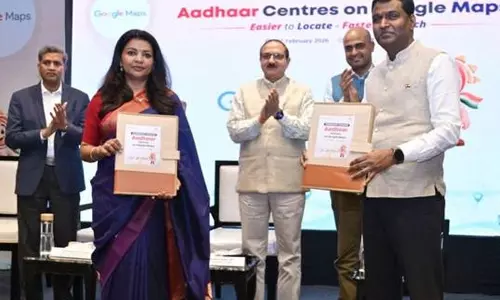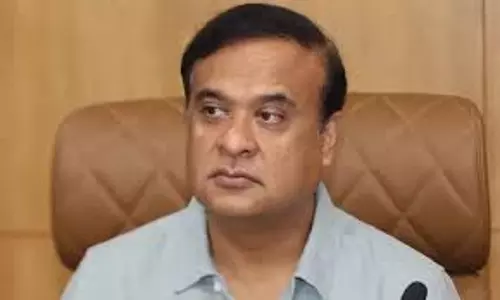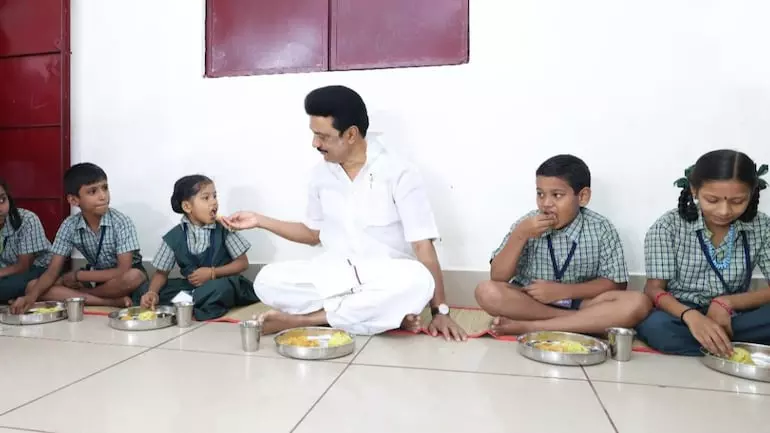
Breakfast in schools: a laudable model from Tamil Nadu
text_fieldsMK Stalin feeding a child at the inauguration of breakfast scheme for govt schools
The DMK government of Tamil Nadu led by Chief Minister MK Stalin has launched an exemplary project in the public education sector. A mid-day meal scheme had already been implemented in the public schools of our country with the cooperation of the central and state governments for more than two and a half decades with the aim of providing nutrition along with education and ensuring the learning and health of the children. Stalin and his colleagues have expanded this scheme by including breakfast in it. Henceforth, school breakfast will be prepared for all the students of the state studying in classes one to five in government schools. The Chief Minister inaugurated the initial phase of the project on Thursday at a primary school in Madurai by having breakfast with the students. Initially, around one and a half lakh children in 1,500 schools will be benefited by the breakfast programme. An amount of Rs 33.5 crores has been allocated for this. In his speech on its inauguration, Stalin said that this project was not any kind of philanthropic or charitable work but was part of the primary duties of the government which has decided that the money coming for this project should not be considered as excess expenditure.
This first-of-its-kind breakfast experiment in the country is historic and worth emulation by any standard. Tamil Nadu is also the state that started the distribution of mid-day meal in schools in our country. It was when prominent jurist and industrialist of Madras province and one of the founding leaders of 'Justice Party', P Theagaraja Chetty was the Mayor of the Madras Corporation that a decision was taken to serve rice porridge for lunch in all government schools in the region. Stalin's historic project is launched one hundred years after that historic event. Theagaraj's porridge scheme was terminated by the British in the late 1930s. Later, when K Kamaraj became chief minister, the scheme was re-introduced n 1956. There is an incident that is said to have inspired him. Once during a road journey Kamaraj had to wait for a while at a railway level crossing for the train to pass. At that time, a few children passed by herding the cows and he asked them "Why didn't you go to school?" His official vehicle, which generally should have kept a distance from public view, was not even fitted with a beacon light. Not realizing that it was the Chief Minister in the car, one of the children said: "If we go to school, who will give us food to fill our stomach?". Stalin had to hear a similar response recently. When he visited a school in Chennai, he learned from their conversations that many children did not eat breakfast, and he was persuaded to think seriously about introducing breakfast in schools.
Food scarcity is a reality in post-Covid India. There are also have reports of many families reducing three meals a day to two. Therefore, the fact that many are denied breakfast is only a corollary of that adversity. What the students of Chennai told Stalin is nothing different, and it is an ongoing tragedy all over India. Although the new education policy had suggested that students should be given breakfast in school, the central government ruthlessly struck it off, citing financial burden. Thus Stalin's response to that also represents a political response to that merciless act. This is also the time when the school lunch scheme run by the government has been in the doldrums. Due to non-availability of the 60 per cent central allocation for the implementation of the mid-day meal scheme, its distribution is often disrupted, including in Kerala. It hasn't stopped only thanks to the cooperation of PTA and others. There have even been reports of students being served chapati and salt in northern states like UP. It is in this context that Stalin's breakfast scheme assumes significance. It wouldn't be wrong to view this as a constructive defence against the inhumane economic and educational policies of fascism. 'Opposition states' including Kerala can also participate in this struggle. Kerala, which has been distributing mid-day meal in schools as early as since the 1980s, can set a different example in this regard.






















